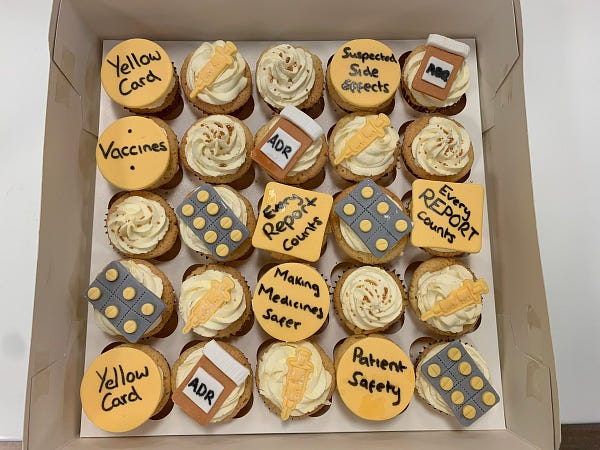If you find these posts interesting and think others might do so, spread the word.
This is Medicines Safety Week, when there is a concerted push to bring attention to the importance of reporting the adverse effects of medicines and drugs. There’s a hashtag on twitter #medsafetyweek you follow, where a lot of grass roots activity is happening (as well as regulators pitching in).


If the only effect is to stimulate a few people to start reporting more often, that’s a big win. Most people never report. If you a healthcare professional and report once this year, you are outperforming most of your colleagues.
If you are in the UK, you can find some posters here for printing.
Deprescribing in Palliative Care
There’s an interesting paper on deprescribing tools in palliative care in the journal Supportive Care in Cancer, that shows that many of the generic deprescribing tools are unsuitable for use in this group of patients, with only one palliative care specific tool externally validated. As with any area of drug-related problems, they note that ‘far more literature on the incidence of PIMs is available, than on methods for reducing them.’
I used to work in a hospice, long before the term deprescribing was coined, and one of the most effective additional quality of life interventions we could do was to remove the burden of drugs that were no longer required. It was, however, an area that required good communication and an understanding of both patient and carers expectations.
Tools can blunt. Experience, knowledge, and the confidence to act on issues is just as important.
Evidence Based Medicine 2.0
David Nunan at the Centre for Evidence-Based Medicine has blog post calling for the reboot of evidence based medicine. It’s an interesting read and I won’t attempt to reformulate it here. I will pick out two elements in the list he gives:
The pandemic gave rise to the worlds greatest Infodemic. Misinformation is rife. But policing and censorship is not the answer. The boundary between debatable unknowns and uncertainty versus misinformation can become very blurred. What would be considered misinformation today becomes tomorrow’s “evidence-based”. The answer is EIHC - confronting, discussing, debating, and refuting ideas based on its core principles - transparent judgements of evidence in context (though social media organisations should be prohibited/regulated from measuring and capturing attention).
Hand in hand with tackling the infodemic is the communication of evidence. This again showed the best and worst. The worst for me was the lack of communication of uncertainty. Here I am not talking about acknowledging uncertainty. The need to “express uncertainty” was stressed by many, but far too few gave examples of exactly how. The best came in the form of efforts to empirically demonstrate that communicating uncertainty doesn’t impact trustworthiness. The EIHC community must build on this and do better with demonstrating how to informatively and accessibly express uncertainty.
These two are linked to some extent, but I think David is right to argue that polling and censorship is not the right approach. At the start of the pandemic there were missteps by authorities. If anything not in line with authorities had been censored at that point, then some useful correctives that have probably saved lives would not have happened. Free and open debate, in journals and the internet is a cornerstone of the how we get to the closest approximation of the truth. If we start to tamper with the ‘Constitution of Knowledge’ we endanger the production of knowledge itself.
“reality based community [is] the social network which adheres to liberal science’s rules and norms … objectivity, factuality, rationality: they live not just within individuals’ minds and practices but on the network”. This community includes not only the hard sciences but also such fields as scholarship, journalism, government and law, in a “marketplace of persuasion” driven by pursuit of truth under clear standards of objectivity.
Talking about vaccine safety
Openness and transparency, and expressing uncertainty, are themes I return to in this podcast on vaccine safety I was interviewed on. I hope it of interest. https://www.buzzsprout.com/618871/9482726
I also touch the issues surrounding academics and twitter, and whether it is a worthwhile pursuit. I have my doubts.
My apologies for the long gap in posts, it’s been a little frantic.
That’s all and stay safe.
Anthony
Don’t forget to report your suspected adverse effects from medicines and vaccines. In the UK, this means using the Yellow Card Scheme.



